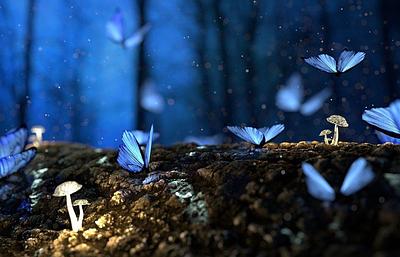Looking for all Articles by Andrew Pettigrew?
Five tips to avoid fantasy writing disaster
Former What's Your Story? participant, prize-winning writer and poet Andrew Pettigrew shares his top tips for avoiding disaster when writing fantasy

Fantasy. It's a genre that has fascinated us for years, filled with mighty heroes and fire-breathing dragons. But, as much as the world of fantasy writing is overflowing with fun and wonder, it is also riddled with traps that are so easy to fall into and incredibly hard to climb out of.
So, how can you avoid the blood-sucking vampires of fantasy writing? How can you make sure you won't irritate your readers and wind up pursued by an angry mob dressed as the entire cast of Game of Thrones? The answer (hopefully) lies in the remainder of this blog. I may not be a white-bearded wizard or a world famous fantasy writer, but I reckon I can give you some advice...
Unchoose the chosen one
Hidden away in a secret tomb far beneath the earth's surface lies an ancient prophecy which foretold me writing this blog post, declaring that I am the Chosen One of Broggington. Forgive my strange sense of humour, but it can safely be said that this is one trope you may want to avoid. That's not to say you can't use it, but maybe think about how you can subvert it instead. An example I like to use is Anakin Skywalker in Star Wars — here, we initially have a typical Chosen One, destined to bring balance to the galaxy... only for him to betray everyone, blow up a planet and become an evil dictator. Far more interesting, you have to admit.
Rein in the magic
I think we can all agree that, at its heart, fantasy is all about magic. Whether it's the sparks that fly from a wand or the energy that runs through a fairy's veins, magic is as mysterious as it is exciting. Yet, as cool as magic is, it's important to realise that it shouldn't do everything. It can't solve all your problems or your readers are going to get bored. Imagine how dull Harry Potter would have been if all Harry had to do was stroll up to Voldemort and wiggle his fingers to make him disappear.
So, when you're writing your fantasy story, place some restrictions on your magic. Perhaps your magic system hurts people who overuse it, or you need to drink six cans of Irn Bru beforehand (anything's possible). It's also not a bad idea to make your magic-users few and far between, but, ultimately, that's up to you.
Flesh out those characters
I know, I know, you're rolling your eyes at me. Of course, you already know this, every writer does. But it seems that, when we get to fantasy writing, it's very easy to forget this golden rule. Think of how many times you've seen two-dimensional characters appear on the page like cardboard cut-outs. There's loads of them: the dastardly villain who likes to explain all his wicked plans; the beautiful yet air-headed princess who spends her time waiting for her knight in shining armour; the mysterious old man who guides the hero on their quest.
This point is similar to the Chosen One comment. You can use them — no one's about to police it — but why not get creative? Putting clichés on their heads can be a lot of fun. For instance, why not make it so the princess escapes the tower by herself? She can go for a McDonald's drive-through while the knight scratches his head in bewilderment.
There are other holiday destinations on TripAdvisor
Lord of the Rings is one of my favourite fantasy series and I even dressed up as Gandalf for Comic Con a couple of years ago. Its influence across the genre cannot be overlooked, yet there's a difference between being inspired by it and ripping it off completely. I'm particularly thinking about the setting here — medieval Europe is a popular holiday destination for all things fantasy, but why not look at other cultures and eras? Leigh Bardugo's Grishaverse is set in a country based on Imperial Russia and I for one found that a refreshing change.
Let's get a little wild
Do you ever wonder whether unicorns actually like being talked about all the time? No? Me neither, but I still think there's a need for different magical creatures. Call it proportional representation — there's a thousand dragons out there but how many kelpies can you name?
And that's us, folks. Was this helpful? I have no idea, but I hope so. The main point I'm trying to make here is, don't be afraid of shaking things up a little. You never know, if you shake it up hard enough, you might end up with a milkshake.